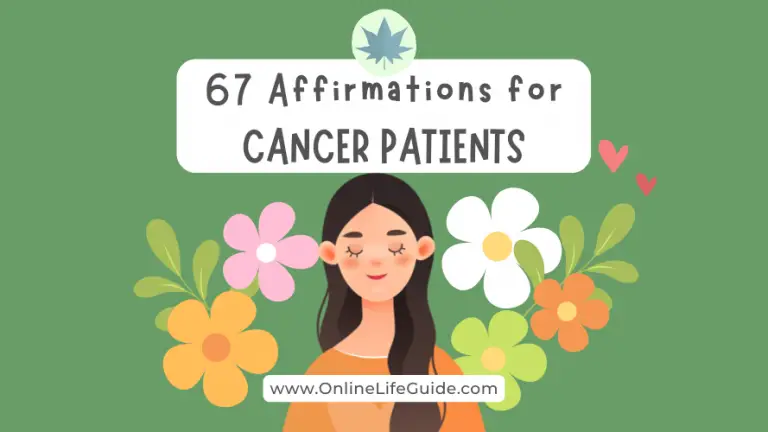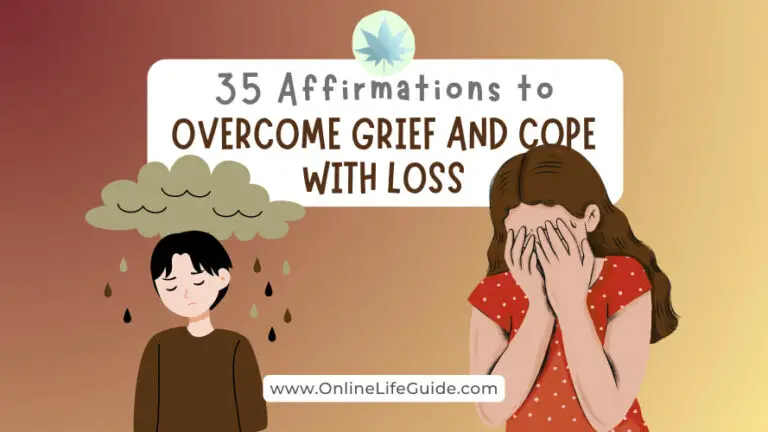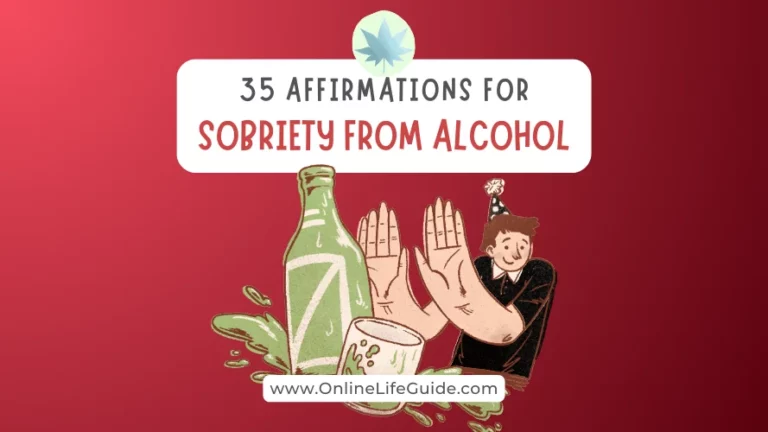49 Affirmations for Fear of Intimacy

Do any of you ever find it challenging to fully open up and connect on a deeper level in your romantic relationships? Many people experience fear of intimacy, which can manifest in various ways.
What is Fear of Intimacy?
Fear of intimacy is a complex phenomenon that can manifest in difficulty forming close emotional or physical connections in romantic relationships.
People with this fear may crave intimacy but subconsciously push partners away or sabotage relationships before they reach a deeper level. The fear can encompass both emotional vulnerability and physical intimacy, or one more than the other.
People with this fear might engage in behaviors that damage potential relationships, like being overly critical or emotionally distant. But despite the fear, there’s often a longing for deeper connection, leading to feelings of frustration or isolation.
Signs You Might Have Fear of Intimacy

- Emotional Distance: Do you struggle to share your vulnerabilities and true feelings with a partner? Do you find it difficult to build a strong emotional connection?
- Relationship Instability: Do you find yourself in frequent arguments or experience a cycle of getting close and then pulling away in your relationships?
- Commitment Phobia: Are you drawn to casual flings over committed relationships?
- Difficulty with Vulnerability: The idea of being truly vulnerable with someone, sharing your deepest desires and fears, might feel overwhelming. This discomfort can hinder intimacy and prevent genuine connection.
- Physical Affection Issues: Do you feel uncomfortable with physical touch or affection, even with someone you care about?
- Unexpressed Needs: Do you have trouble communicating your needs and wants within a relationship? This can lead to misunderstandings and resentment, ultimately hindering intimacy.
What are the Root Causes of Fear of Intimacy?

Fear of intimacy can sprout from various seeds sown in our past experiences. Here are some of the root causes:
1. Childhood Trauma:
- Abuse (Physical, Emotional, S * x u a l): Experiencing abuse in childhood can make it difficult to trust and form secure attachments with others in adulthood. The unpredictable or unsafe environment can create a fear of vulnerability and intimacy.
- Neglect: When a child’s emotional or physical needs are consistently neglected, they may learn to detach as a coping mechanism. This disconnection can carry over into adult relationships, making intimacy feel unsafe.
2. Past Relationship Issues:
- Breakups or Betrayals: Painful experiences like breakups, unfaithfulness, or betrayals can leave emotional scars. The fear of getting hurt again can lead someone to build walls and avoid intimacy to protect themselves.
3. Low Self-Esteem:
- Doubting Your Worthiness of Love: If you don’t believe you deserve love or fear rejection, it can be difficult to open yourself up to intimacy. This fear of rejection can be a barrier to forming close connections.
4. Anxiety Disorders:
- Social Anxiety: People with social anxiety may fear rejection in any social setting, including romantic relationships. This can lead to difficulty in forming close bonds and experiencing intimacy.
- Avoidant Personality Disorder: This personality disorder is characterized by a pattern of social inhibition, feelings of inadequacy, and a hypersensitivity to negative evaluation. These traits can make it difficult to form close relationships and experience intimacy.
5. Cultural Background:
- Strict Upbringing: Some cultural backgrounds may discourage open communication about emotions or physical intimacy. This can lead to confusion and difficulty navigating healthy intimacy in adult relationships.
How Affirmations Work and How Can They Help

Affirmations may seem simple on the surface, but science is starting to shed light on why they can be so effective in overcoming fear of intimacy and other challenges. Here’s a breakdown of the science behind affirmations:
- Self-Affirmation Theory: This theory, proposed by Claude Steele, suggests that humans have a fundamental need to maintain a positive self-view. Affirmations can help fulfill this need by reminding us of our strengths and values.
- Brain Response: Studies using MRI scans show that repeating affirmations activates areas of the brain associated with self-processing and reward. This suggests that affirmations can not only change our self-perception but also trigger positive feelings associated with achieving goals.
- Neuroplasticity: The brain has the ability to change and adapt throughout life (neuroplasticity). Affirmations, by promoting positive self-talk, may help strengthen neural pathways associated with positive self-belief and desired behaviors.
- Cognitive Restructuring: Affirmations can challenge negative thought patterns and replace them with more positive ones. This cognitive restructuring can lead to a shift in how we perceive ourselves and the world around us.
49 Affirmations for Overcoming Fear of Intimacy

The following affirmations are broken down into sub-categories designed specifically to address and target different aspects of fear of intimacy:
1. Overcoming Fear of Intimacy and Feeling Safe in Relationships
- I am worthy of safe and loving connections.
- My vulnerability strengthens my relationships, not weakens them.
- I choose courage over fear and open myself to the possibility of intimacy.
- I release the belief that intimacy equals loss and embrace its power to create joy.
- Taking risks in love allows me to experience deeper levels of connection.
- I am capable of handling both the beauty and vulnerability of intimacy.
- My past experiences do not define my future relationships.
2. Embracing Vulnerability in Romantic Relationships
- Sharing my true self is a strength, not a weakness.
- I am safe to be vulnerable with my partner, and they are safe to be vulnerable with me.
- Vulnerability allows for deeper understanding and connection in my relationship.
- Open communication strengthens the foundation of trust and intimacy.
- I am worthy of receiving love and support when I am vulnerable.
- My imperfections are what make me unique and lovable.
- Expressing my emotions allows for a more fulfilling and authentic relationship.
3. Releasing Past Traumas that Led to Fear of Intimacy
- I forgive myself and others for past hurts that no longer serve me.
- I release the pain of the past and choose to create a loving present.
- I am not defined by my past experiences; I am empowered by my present choices.
- I deserve to feel safe and loved in the present moment.
- Old wounds are healing, and I am open to experiencing healthy intimacy.
- I choose to let go of the past and embrace the potential for love in the now.
- Past experiences are lessons, not life sentences.
4. Fear of Abandonment and Rejection
- I am worthy of love and belonging, regardless of external circumstances.
- Rejection is not a reflection of my worth, but a redirection to something better.
- I have the strength to handle disappointment and move forward with grace.
- My self-worth comes from within, not from the validation of others.
- Healthy relationships are built on trust and communication, not fear of abandonment.
- I release the fear of being left alone and embrace the possibility of lasting love.
- My happiness does not depend on the actions of others; it comes from within.
5. Trusting Yourself and Your Potential Partner
- I trust my intuition and ability to choose a loving and supportive partner.
- I am worthy of a partner who cherishes my vulnerability and loves me for who I am.
- My inner voice guides me towards healthy and fulfilling relationships.
- I release the need to control every aspect of the relationship and embrace open communication.
- Trust is a choice, and I choose to trust my partner and myself in this relationship.
- Healthy skepticism is good, but blind fear only hinders intimacy.
- Creating a safe space for trust allows for a deeper connection to build.
6. Opening Yourself Up for Deeper Connection with Partner
- I am open to experiencing the joy and intimacy that comes with deep connection.
- Sharing my dreams, fears, and desires with my partner strengthens our bond.
- Creating shared experiences fosters a deeper sense of connection and intimacy.
- Actively listening to my partner builds trust and strengthens our emotional connection.
- Physical intimacy, with open communication and consent, deepens our connection.
- Celebrating differences and finding common ground creates a stronger emotional bond.
- Creating a safe space for open communication allows intimacy to flourish.
7. Building Healthy and Fulfilling Relationships
- I am committed to creating a loving and supportive relationship with my partner.
- I set and maintain clear, respectful boundaries that empower both me and my partner to thrive within the relationship.
- Honest communication and mutual understanding allow our love to blossom.
- By appreciating each other’s needs and desires, we create a harmonious and balanced partnership.
- Celebrating each other’s growth, both personally and as a couple strengthens the bond we share.
- Our relationship stays vibrant and exciting as we continuously learn and grow, together and individually.
- Open communication and a willingness to compromise pave the way for a lasting and fulfilling love.
Tips for Using These Affirmations to Embrace Intimacy
Here are some tips to maximize the effectiveness of your chosen affirmations and truly overcome your fear of intimacy:
Personalization is Key
- Choose affirmations that resonate with you. Not all affirmations will strike a chord with everyone. Pick ones that feel genuine and believable for you.
- Make them personal. Feel free to modify and adapt the affirmations to your specific situation if needed.
Repetition is Power
- Consistency is crucial. Aim to repeat your chosen affirmations several times a day, especially during moments of anxiety about change.
- Schedule reminders. Set alarms or notifications on your phone to remind yourself to repeat your affirmations throughout the day.
- Incorporate them into your routine. Write them down and post them around your house or workspace, or record them and listen back during your commute.
Focus on the Present
- Use present tense statements. Affirmations phrased as “I am” or “I can” are more impactful than those in the future tense. For example, “I am opening myself up to a deeply intimate relationship with my partner” is more powerful than “I will be more intimate in my relationship.”
- Feel the emotion. Don’t just go through the motions of repeating words. Connect with the positive emotions associated with the affirmation. Visualize yourself successfully navigating a successful lifestyle.
Combine with Action
- Affirmations are a powerful tool, but they’re not a magic solution. While repeating affirmations can shift your mindset, pair them with action for optimal results.
- Set specific goals. For example, if your affirmation is “I am opening myself up to deeper conversation and emotional connection” create a goal to research more about deepening emotional connection and having better conversations with your partner, then set small goals to apply what you’ve learned bit by bit.
- Take small steps forward. Don’t try to overhaul your life and your relationship overnight. Celebrate small victories as you move through the change process.
Be Patient and Kind to Yourself
- Change takes time. Don’t get discouraged if you don’t yet feel completely comfortable with emotional or physical intimacy with your partner. Give yourself time and allow the affirmations to have their effect on your subconscious mind as you repeat them daily.
- Self-compassion is key. Be easy with yourself and celebrate your progress, no matter how small. Give yourself credit where it’s due, even if it’s small progress in the right direction.
- Focus on the journey, not just the destination. Enjoy the process of learning and growing about yourself and your love life. Don’t put pressure on yourself. Do put the burden of your own expectations on your shoulders. Focus on the process and progress, not the idealistic end result.
A Life with a Deeply Intimate and Fulfilling Relationship

Imagine a life where you have a deeply intimate and fulfilling relationship. Picture a love story with your partner where vulnerability is a strength, not a weakness.
Imagine open communication where fears and dreams are shared freely, building a foundation of trust and understanding.
See yourselves celebrating each other’s victories and offering a comforting embrace during challenges.
Feel the joy of shared experiences, laughter echoing through your days and the comfort of a safe space where you can truly be yourself.
This deeply fulfilling connection is within your reach.
By understanding the fear of intimacy and embracing the power of affirmations, you can open yourself up to the possibility of experiencing love in its richest form.
Take the first step today, and embark on a journey towards a relationship that nourishes your soul and brings immense joy to your life.
Affirmations for Other Fears
If you have any other fears or anxieties that have been limiting your life and keeping you from experiencing life to the fullest, please check out THIS article where you’ll find a whole list of affirmations specialized for different kinds of fears.
Feel free to leave your thoughts and experiences in the comments section below.
Make sure to take good care of yourself! Talk to you soon…








